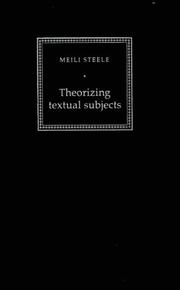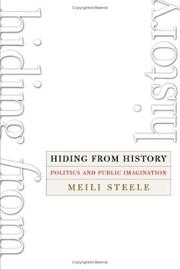| Listing 1 - 5 of 5 |
Sort by
|

ISBN: 0511583109 0511004893 9780511004896 0521571855 0521576792 9780511583100 9780521571852 0521571855 9780521576796 0521576792 Year: 1997 Volume: 21 Publisher: Cambridge Cambridge University Press
Abstract | Keywords | Export | Availability | Bookmark
 Loading...
Loading...Choose an application
- Reference Manager
- EndNote
- RefWorks (Direct export to RefWorks)
This book addresses the central crisis in critical theory today: how to theorise the subject as both a construct of oppressive discourse and a dialogical agent. By engaging with a wide range of leading political, philosophical, and critical thinkers - Jameson, Habermas, MacIntyre, Rorty, Taylor, Benhabib, and West are all critiqued - Meili Steele proposes linking language with human agency in order to develop an alternative textual and ethical theory of the subject. Steele shows how constructivist theories of agency fail to account for the ethical implications of the supposed contingency of all contexts, and how dialogical theorists fail to acknowledge the insight of postmodern critiques. Developing this theory through readings of texts that address issues of identity, politics, race, and feminist theory, Steele illustrates that we do not have to choose between an idealised or demonised modernity.
Criticism. --- Critical theory. --- Critical social theory --- Critical theory (Philosophy) --- Critical theory (Sociology) --- Negative philosophy --- Criticism (Philosophy) --- Philosophy, Modern --- Rationalism --- Sociology --- Frankfurt school of sociology --- Socialism --- Criticism --- Evaluation of literature --- Literary criticism --- Literature --- Rhetoric --- Aesthetics --- Technique --- Evaluation --- Fiction --- English literature --- anno 1800-1899 --- anno 1900-1999 --- Arts and Humanities

ISBN: 1501717847 9781501717840 0801443857 9780801443855 Year: 2018 Publisher: Ithaca, NY
Abstract | Keywords | Export | Availability | Bookmark
 Loading...
Loading...Choose an application
- Reference Manager
- EndNote
- RefWorks (Direct export to RefWorks)
In Hiding from History, Meili Steele challenges an assumption at the heart of current debates in political, literary, historical, and cultural theory: that it is impossible to reason through history. Steele believes that two influential schools of contemporary thought "hide from history": liberal philosophies of public reason as espoused by such figures as Jürgen Habermas, Martha Nussbaum, and John Rawls and structuralism/poststructuralism as practiced by Judith Butler, Hayden White, and Michel Foucault. For Steele, public reasoning cannot be easily divorced from either the historical imagination in general or the specific legacies that shape, and often haunt, political communities.Steele introduces the concept of public imagination-concepts, images, stories, symbols, and practices of a culture-to show how the imaginative social space that citizens inhabit can be a place for political discourse and debate. Steele engages with a wide range of thinkers and their works, as well as historical events: debates over the display of the Confederate flag in public places; Ralph Ellison's exchange with Hannah Arendt over school desegregation in Little Rock; the controversy surrounding Daniel Goldhagen's book, Hitler's Willing Executioners; and arguments about the concept of a "clash of civilizations" as expressed by Samuel Huntington, Ashis Nandy, Edward Said, and Amartya Sen. Championing history and literature's capacity to articulate the politics of public imagination, Hiding from History boldly outlines new territory for literary and political theory.
History --- Historiography. --- Public history. --- Applied history --- History, Modern --- Historical criticism --- Authorship --- Philosophy. --- Philosophy --- Criticism --- Historiography
Digital
ISBN: 9781501717840 Year: 2018 Publisher: Ithaca, N.Y. Cornell University Press
Abstract | Keywords | Export | Availability | Bookmark
 Loading...
Loading...Choose an application
- Reference Manager
- EndNote
- RefWorks (Direct export to RefWorks)
Book
Abstract | Keywords | Export | Availability | Bookmark
 Loading...
Loading...Choose an application
- Reference Manager
- EndNote
- RefWorks (Direct export to RefWorks)
Book
Year: 1971 Publisher: Ottawa Department of Energy, Mines and Resources
Abstract | Keywords | Export | Availability | Bookmark
 Loading...
Loading...Choose an application
- Reference Manager
- EndNote
- RefWorks (Direct export to RefWorks)
| Listing 1 - 5 of 5 |
Sort by
|

 Search
Search Feedback
Feedback About UniCat
About UniCat  Help
Help News
News